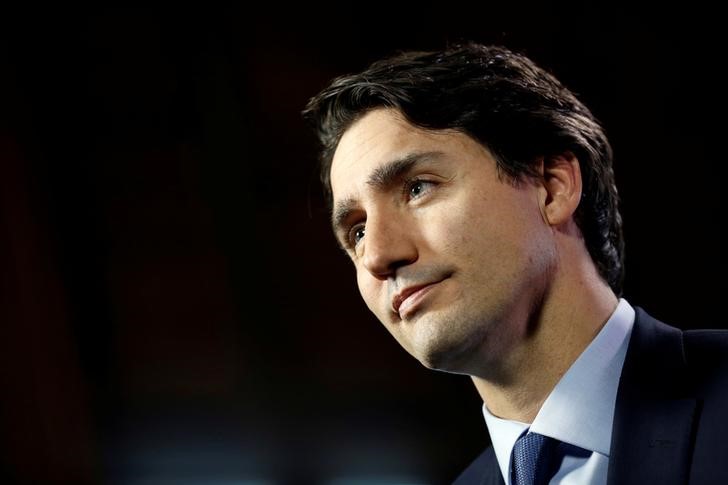By David Ljunggren
OTTAWA, Nov 30 (Reuters) - Despite open signs of nervousness among legislators, Canada's ruling Liberals bet they can survive the political damage caused by allowing a pipeline to be built from the Alberta oil sands to the Pacific coast.
Prime Minister Justin Trudeau on Tuesday approved Kinder Morgan (NYSE:KMI) Inc's KMI.N plan to lay a second pipeline along the route of its existing Trans Mountain line, setting up a conflict with environmentalists who helped him win power last year. line travels from Alberta's oil sands to British Columbia, which has become a power base for the Liberals. Opponents predict angry provincial voters could kick out many of the Liberal's 17 legislators in a federal election set for October 2019.
This could weaken Trudeau's hold on power. He only has a working majority of 15 in the House of Commons, and unless he won seats elsewhere he could be reduced to a minority and forced to rely on other parties to govern.
Liberals feel time is on their side. While Kinder Morgan plans to start construction in September 2017, party insiders say the company is likely to face a series of protracted court challenges before it can dig.
This means there will be no television shots of protestors confronting construction workers. Video of demonstrations against a pipeline project near a Native American reservation in North Dakota has gone viral, helping spread awareness of the standoff. are the protesters going to keep this issue alive when the next election is almost three years away and nothing is going to happen between now and then?" said one Liberal with direct knowledge of the file.
Two Liberal legislators from British Columbia openly spoke out against the pipeline before Trudeau's announcement and two other members of the caucus on Wednesday told reporters they were unhappy.
Veteran party members say their colleagues need to take a longer view.
"Even if an election were held tomorrow we'd lose perhaps four seats in British Columbia. As for 2019, it looks as though we'll lose two," said a second well-placed Liberal.
Approving the pipeline is part of Trudeau's strategy to tackle climate change while showing enough support for energy projects to deflect charges his center-left Liberals oppose the oil and gas industry.
Liberals say that regardless of the potential pitfalls in British Columbia, Trudeau had to approve Trans Mountain to ensure support from the energy-producing province of Alberta, which has long clamored for more pipelines.
The province is key to Trudeau's plans to introduce a national carbon price and the province's left-leaning premier, Rachel Notley, had made clear she would back the carbon plan if Ottawa approved Trans Mountain.
"If she doesn't get a pipeline it's game over for a national carbon strategy," said a third Liberal. If Notley loses the next election, due in 2019, she will undoubtedly be replaced by a party that rejects the idea of carbon pricing.
Alberta could end up with another pipeline if U.S. President-elect Donald Trump fulfils a promise to allow TransCanada Corp TRP.TO to build its Keystone XL line. Barack Obama had vetoed the project in 2015.
That could make it easier for Trudeau to veto another potentially tough project - TransCanada's proposed Energy East pipeline from Alberta to the Atlantic coast.
Opposition to the pipeline is high in the predominantly French-speaking province of Quebec, where the Liberals hold a whopping 40 seats, and can ill afford to suffer losses.
